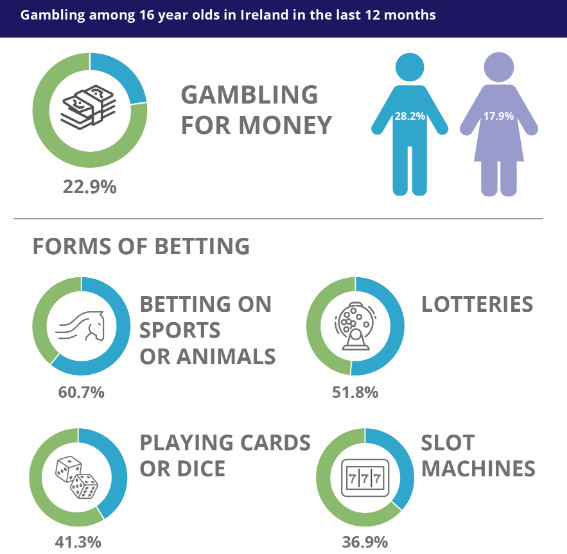A fresh report highlights the need for additional gambling regulations with a view to further protecting children and vulnerable members of society, suggested Ireland’s Institute of Public Health.

It was also said that ‘children and gambling – evidence to inform regulation and responses in Ireland’ underscores the need for further data on children and gambling to be collected, in addition to monitoring via national health surveys to be undertaken.
The joint report published by the IPH and TobaccoFree Research Institute Ireland analysed responses of 1,949 Irish 16-year-olds, which formed part of a larger Europe-wide survey.
It was found that 22.9 per cent of respondents reported gambling for money in the 12 months prior, with this rate higher among boys (28.2 per cent) compared to girls (17.9 per cent).
Sports betting was found to be the most common activity with 60.7 per cent of respondents indicating participation, this is followed by lotteries (51.8 per cent), cards or dice (41.3 per cent) and slots (36.9 per cent).
Problem gambling worries
Of the respondents that gambled for money during the previous year, 10.3 per cent said that they had experienced excessive gambling, while 5.6 per cent met the criteria for problem gambling.
“Children were considered to be experiencing problem gambling if they reported feeling the need to lie to important people about how much money they gambled and if they felt the need to bet more and more money,” the report noted.
Approximately 21.3 per cent of 16-year-olds reported getting into difficulty with controlling their gambling, 19 per cent felt the need to bet more and 8.1 per cent suggested that they had lied about how much they had wagered.
The report also found that boys exhibited different gambling behaviours than girls and had higher odds of excessive gambling, with 80 per cent of those experiencing excessive or problem gambling being male.
Among those who gambled in the previous year, excessive gambling was around three times more common among boys than girls, with problem gambling over two and a half times.
Public health approach
Reflecting on the findings, Dr Helen McAvoy, IPH Director of Policy, suggested that this calls for a public health approach to reduce gambling harms, with rates among this age group in Ireland said to be around the European average.
Furthermore, Ciara Reynolds, IPH Public Health Development Officer, noted that these findings will help to inform ongoing gambling reform in Ireland.
“The report highlights the need for further research on children and gambling in national surveys to build on our evidence and produce more focussed approaches to protect children from gambling-related harm,” she said.
Ministerial response
James Browne, Minister for State with responsibility for Law Reform and Youth Justice, called the report “ deeply troubling”, as well as one that highlights that society “must protect children and vulnerable citizens from the harms associated with gambling”.
Here, he highlighted ongoing legislative work to ensure that such ambitions are met and exceeded, with fresh power to be handed to the Gambling Regulatory Authority of Ireland.
This will enable the group to address the issue of gambling advertising on social media, online, and on traditional media such as television and radio, as well as in publications and outdoor advertising, such as billboards.
“Reforming gambling legislation and regulation in Ireland is a key commitment in our Programme for Government and Justice Plan, and has been one of my priorities as Minister,” he explained.
“At its core, the Gambling Regulation Bill is a public health measure. A key focus of the Bill is to protect children from the widespread proliferation of gambling advertising across different forms of media.
“That is why the Bill provides for a watershed prohibiting the broadcast of gambling advertising on television, radio and on audio-visual media services between the hours of 5:30am and 9:00pm.
“The Bill introduces restrictions on the advertisement of gambling activities aimed particularly at protecting children and vulnerable people from the harms of problem gambling.
“The legislation also provides for the establishment and operation of the National Gambling Exclusion Register and also introduces a number of additional measures to protect people who participate in gambling.
“It also establishes a Social Impact Fund, which will be used to finance research and related initiatives to address problem gambling behaviours, to support awareness–raising and educational measures and to support problem gambling treatment activities.
“I expect that the Gambling Regulation Bill 2022 will complete its journey through the Oireachtas early next year, subject to the cooperation of both houses.”












